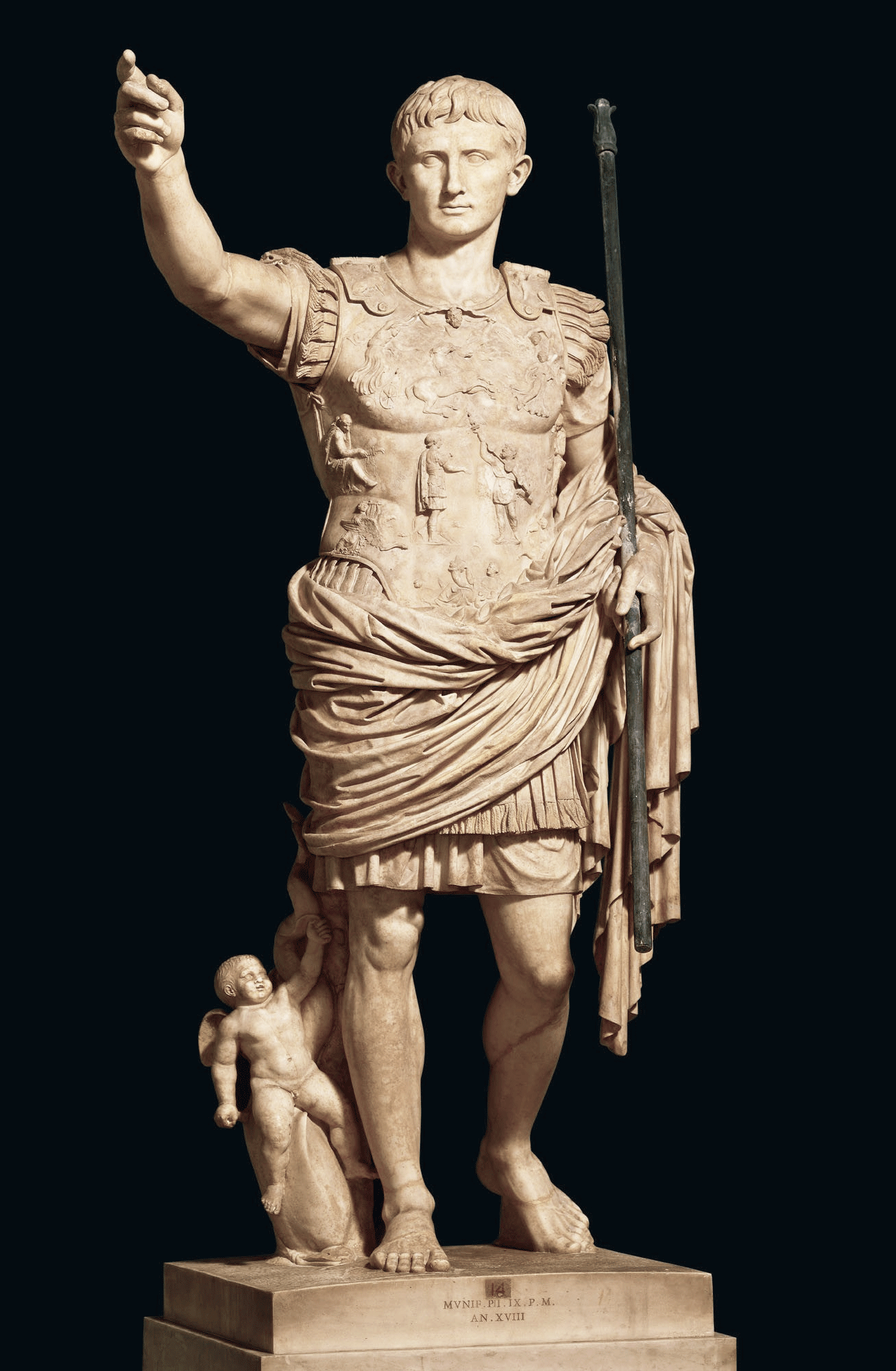THE DIVINE HISTORY OF JESUS CHRIST |
||
THE LIFE AND TIMES OF CLEOPAYTRA,QUEEN OF EGYPTBY ARTHUR E. P. BROME WEIGALL
INTRODUCTORY
ALEXANDER THE GREAT IN EGYPTPTOLEMY I SOTER, THE WINING OF A KINGDOM
CLEOPATRA OF EGYPT, THE MAKING OF A QUEEN
Part I. CLEOPATRA AND CAESAR.
I. AN INTRODUCTORY STUDY OF THE CHARACTER OF CLEOPATRAII. THE CITY OF ALEXANDRIAIII. THE BIRTH AND EARLY YEARS OF CLEOPATRAIV. THE DEATH OF POMPEY AND THE ARRIVAL OF CAESAR IN EGYPTV. CAIUS JULIUS CESARVI. CLEOPATRA AND CESAR IN THE BESIEGED PALACE AT ALEXANDRIAVII. THE BIRTH OF CESARION AND CESAR'S DEPARTURE FROM EGYPTVIII. CLEOPATRA AND CAESAR IN ROMEIX. THE FOUNDATIONS OF THE EGYPTO-ROMAN MONARCHYX. THE DEATH OF CESAR AND THE RETURN OF CLEOPATRA TO EGYPTPart II. CLEOPATRA AND ANTONY.XI. THE CHARACTER OF ANTONY AND HIS RISE TO POWERXII. THE ALLIANCE BETWEEN CLEOPATRA AND ANTONYXIII. CLEOPATRA AND ANTONY IN ALEXANDRIAXIV. THE ALLIANCE RENEWED BETWEEN CLEOPATRA AND ANTONYXV. THE PREPARATIONS OF CLEOPATRA AND ANTONY FOR THE OVERTHROW OF OCTAVIANXVI. THE DECLINE OF ANTONY'S POWERXVII. THE BATTLE OF ACTIUM AND THE FLIGHT TO EGYPTXVIII. CLEOPATRA'S ATTEMPT TO BEGIN AGAINXIX. OCTAVIAN'S INVASION OF EGYPT AND THE DEATH OF ANTONYXX. THE DEATH OFCLEOPATRA AND THE TRIUMPH OF OCTAVIANCLEOPATRA THE GREATNICE READINGCLEOPATRA OF EGYPTCAESAR,THE ALEXANDRIAN WARt. 1. Les cinq premiers Ptolémées (323-181 avant J.-C.)-t. 2. Décadence et fin de la dynastie (181-30 avant J.-C.)t. 3. Les institutions de l'Egypte ptolémaique.t. 4. Les institutions de l'Egypte ptolémaique, suite et finEmpire of the Ptolemies
THE QUEENS OF EGYPTA history of Egypt under the Ptolemaic dynastyA SHORT HISTORY OF GREEK MATHEMATICS
INTRODUCTION.
In the following pages it will be
observed that, in order not to distract the reader, I have refrained from
adding large numbers of notes, references, and discussions, such as are
customary in works of this kind. I am aware that by telling a straightforward
story in this manner I lay myself open to the suspicions of my fellow-workers,
for there is always some tendency to take not absolutely seriously a book which
neither prints chapter and verse for its every statement, nor often interrupts
the text with erudite arguments. In the case of the subject which is here
treated, however, it has seemed to me unnecessary to encumber the pages in
this manner, since the sources of my information are all so
well known; and I have thus been able to present the book to the
reader in a style consonant with a principle of archaeological and
historical study to which I have always endeavoured to adhere, namely, the avoidance of as many of those attestations of
learning as may be discarded without real loss. A friend of mine, an eminent
scholar, in discussing with me the scheme of this volume, earnestly
exhorted me on the present occasion not to abide by this principle.
Remarking that the trouble with my interpretation of history was that I
attempted to make the characters live, he urged me at least to justify the
manner of their resuscitation in the eyes of the doctors of science by
cramming my pages with extracts from my working notes, relevant
or otherwise, and by smattering my text with Latin and Greek
quotations. I trust, however, that he was speaking in behalf of a very small
company, for the sooner this kind of jargon of scholarship is swept into
the world's dust-bin, the better will it be for public education. To my
mind a knowledge of the past is so necessary to a happy mental poise that
it seems absolutely essential for historical studies to be placed
before the general reader in a manner sympathetic to him. History,
said Emerson, no longer shall be a dull book. It shall walk incarnate in
every just and wise man. You shall not tell me by languages and titles
a catalogue of the volumes you have read. You shall make me feel what
periods you have lived.
Such has been my attempt in the
following pages; and, though I am so conscious of my literary
limitations that I doubt my ability to place the reader in touch
with past events, I must confess to a sense of gladness that I, at
any rate, with almost my whole mind, have lived for a time in the company
of the men and women of long ago of whom these pages tell.
Any of my readers who think that my
interpretation of the known incidents here recorded is faulty may
easily check my statements by reference to the classical authors. The
sources of information are available at any big library. They consist of
Plutarch, Cicero, Suetonius, Dion Cassius, Appian, De Bello Alexandrino, Strabo, Diodorus Siculus, Livy, Velleius Paterculus, Seneca, Lucan, Josephus, Pliny, Dion
Chrysostom, Tacitus, Florus, Lucian, Athenaeus, Porphyry, and Orosius.
Of modern writers reference should be made to Ferrero's Greatness and
Decline of Rome, Bouche-Leclercq’s Histoire des Lagides,
Mahaffy's Empire of the Ptolemies, Mommsen’s History of Rome, Strack’s Dynastie der Ptolemaer, and Sergeant’s Cleopatra of
Egypt. There are also, of course, a very large number of works on
special branches of the subject, which the reader will, without much
difficulty, discover for himself.
I do not think that my statements of
fact will be found to be in error; but the general interpretation of the
events will be seen to be almost entirely new throughout the story, and
therefore plainly open to discussion. I would only plead for my views that
a residence in Egypt of many years, a close association with
Alexandria, Cleopatra's capital, and a daily familiarity with Greek and Egyptian
antiquities, have caused me almost unconsciously to form opinions which
may not be at once acceptable to the scholar at home.
To some extent it is the business of
the biographer to make the best of the characters with which he deals, but
the accusation of having made use of this prerogative in the following pages
will not be able to be substantiated. There is no high purpose served by
the historian who sets down this man or that woman as an unmitigated
blackguard, unless it be palpably impossible to discover any good motive for
his or her actions. And even then it is a pleasant thing to
avert, where possible, the indignation of posterity. An undefined sense of
anger is left upon the mind of many of those who have read pages of condemnatory
history of this kind, written by scholars who themselves are seated
comfortably in the artificial atmosphere of modern righteousness. The
story of the Plantagenet kings of England, for example, as recorded by
Charles Dickens in his Child's History of England, causes the
reader to direct his anger more often to Dickens than to those weary,
battle-stained, old monarchs whose blood many Englishmen are still proud
to acknowledge. An historian who deals with a black period must not be
fastidious. Nor must he detach his characters from their
natural surroundings, and judge them according to a code of morals of
which they themselves knew nothing. The modern, and not infrequently
degenerate, humanitarian may utter his indignant complaint against the Norman barons
who extracted the teeth of the Jewish financiers to induce them to deliver
up their gold; but has he set himself to feel that pressing need of money
which the barons felt, and has he endeavoured to
experience their exasperation at the obstinacy of these foreigners? Let
him do this and his attitude will be more tolerant: one might even live to
see him hastening to the City with a pair of pincers in his pocket. Of
course it is not the historian's affair to condone, or become a
party to, a crime; but it certainly is his business to
consider carefully the meaning of the term crime, and
to question its significance, as Pilate did that of truth.
In studying the characters of persons
who lived in past ages, the biographer must tell us frankly whether he
considers his subjects good or bad, liberal or mean, pious or impious; but
at this late hour he should not often be wholly condemnatory, nor, indeed,
need he be expected to have so firm a belief in man's capacity
for consistent action as to admit that any person was so invariably
villainous as he may be said to have been. A natural and inherent love of
right-doing will sometimes lead the historian to err somewhat on the
side of magnanimity; and I dare say he will serve the purpose of history
best when he can honestly find a devil not so black as he is painted.
Being acquainted with the morals of 1509, I would almost prefer to think
of Henry the Eighth as bluff King, than as the most detestable villain that ever
drew breath. I believe that an historian, in sympathy with his
period, can at one and the same moment absolve Mary Queen of Scots
from the charge of treachery, and defend Elizabeth's actions against her
on that charge.
In the case of Cleopatra the
biographer may approach his subject from one of several directions. He may,
for example, regard the Queen of Egypt as a thoroughly bad woman, or
as an irresponsible sinner, or as a moderately good woman in a difficult
situation. In this book it is my object to point out the difficulty of the
situation, and to realise the adverse
circumstances against which the Queen had to contend; and by so doing a
fairer complexion will be given to certain actions which otherwise must
inevitably be regarded as darkly sinful. The biographer need not, for the
sake of his principles, turn his back on the sinner and refuse to consider
the possibility of extenuating circumstances. He need not, as we so often
must in regard to our contemporaries, make a clear distinction between
good and bad, shunning the sinner that our intimates may not be
contaminated. The past, to some extent, is gone beyond the
eventuality of Hell; and Time, the great Redeemer, has taken from the
world the sharpness of its sin. The historian thus may put himself in
touch with distant crime, and may attempt to apologise for it, without the charge being brought against him that in so doing he
deviates from the stern path of moral rectitude. Intolerance is
the simple expedient of contemporaneous society: the historian must show
his distaste for wrong-doing by other means. We dare not excuse the sins
of our fellows; but the wreck of times past, the need of
reconstruction and rebuilding, gives the writer of history and
biography a certain option in the selection of the materials which he
uses in the resuscitation of his characters. He holds a warrant from the
Lord of the Ages to give them the benefit of the doubt; and if it be his
whim to ignore this licence and to condemn
wholesale a character or a family, he sometimes loses, by a sort of
perversion, the prerogative of his calling. The historian must
examine from all sides the events which he is studying; and in regard
to the subject with which this volume deals he must be particularly
careful not to direct his gaze upon it only from the point of view of the
Imperial Court of Rome, which regarded Cleopatra as the ancestral
enemy of the dynasty. In dealing with history, says Emerson, we, as
we read, must become Greeks, Romans, Turks, priest and king, martyr and
executioner. Even so, as we study the life of Cleopatra, we must set behind us
that view of the case that was held by one section of humanity. In like manner
we must rid ourselves of the influence of the thought of any one period, and
must ignore that aspect of morality which has been developed in us by
contact with the age in which we have the fortune to live. Good and evil
are relative qualities, defined very largely by public opinion; and it must
always be remembered that certain things which are considered to be
correct today may have the denunciation of yesterday and tomorrow. We, as we
read of the deeds of the Queen of Egypt, must doff our modern conception
of right and wrong together with our top-hats and frock-coats; and, as we
pace the courts of the Ptolemies, and breathe the atmosphere of the first
century before Christ, we must not commit the anachronism of criticising our surroundings from the standard of
twenty centuries after Christ. It is, of course, apparent that to a great
extent we must be influenced by the thought of today; but the true
student of history will make the effort to cast from him the shackles
of his contemporaneous opinions, and to parade the bygone ages in the
boundless freedom of a citizen of all time and a dweller in every land
|
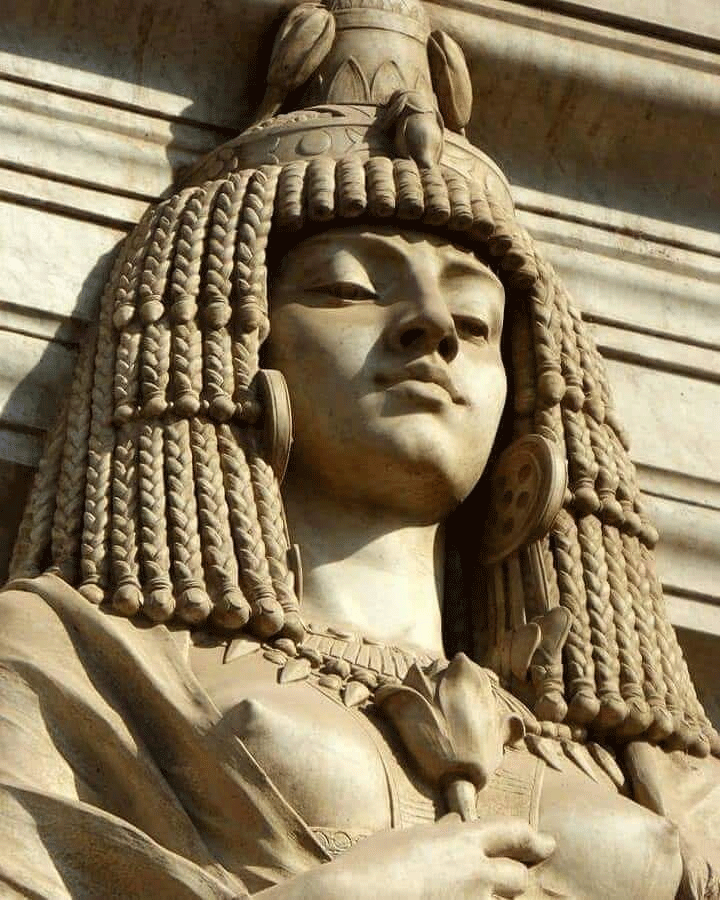
PORTRAIT OF A GREEK LADY " THE PAINTING DATES FROM A GENERATION LATER THAN THAT OF CLEOPATRA, BUT IT IS AN EXAMPLE OF THE WORK OF THE ALEXANDRIAN ARTISTS |
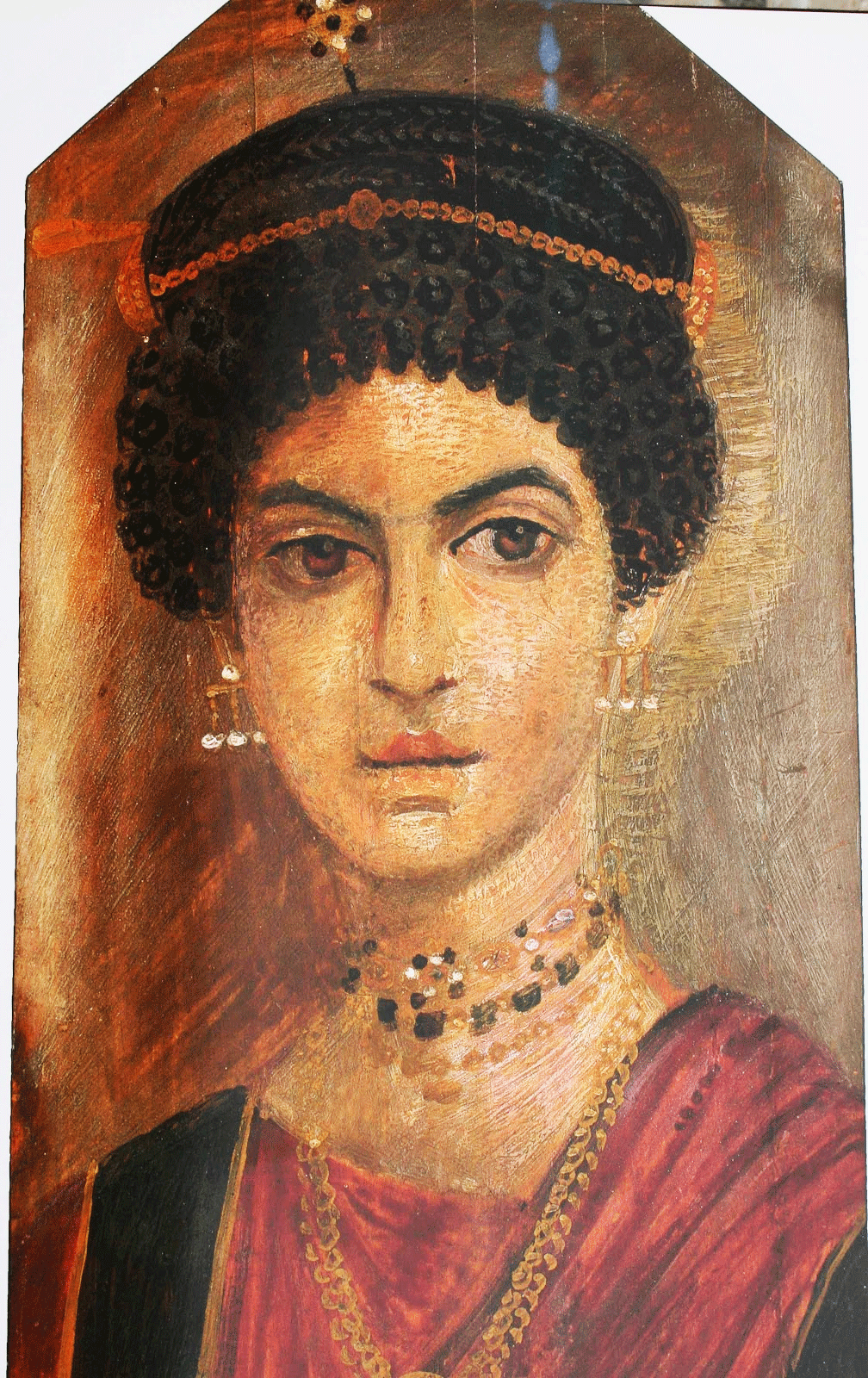
SERAPIS. THE CHIEF GOD OF ALEXANDRIA. |
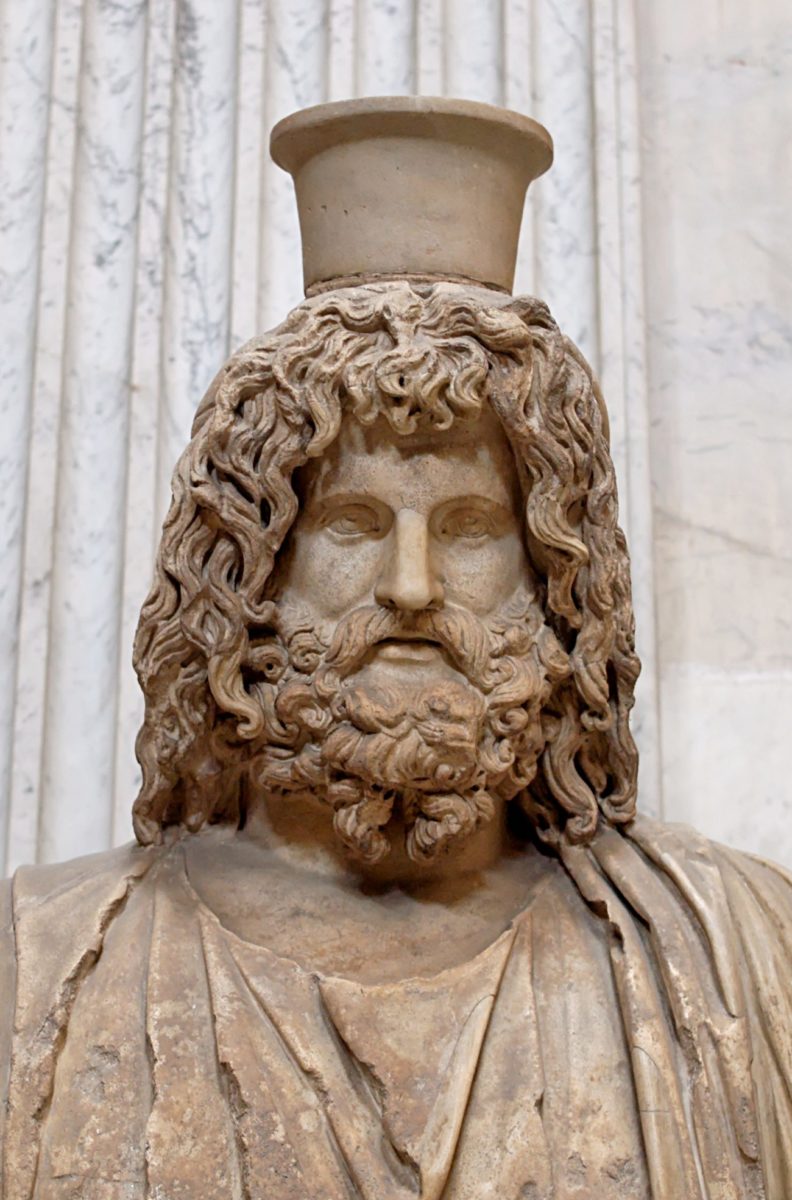
POMPEY THE GREAT |
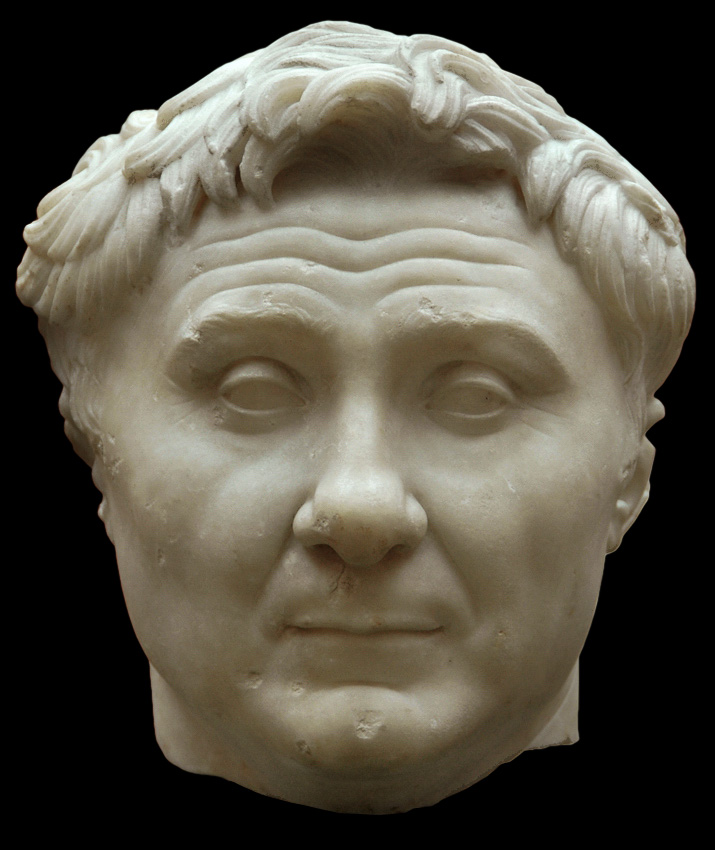
JULIUS CAESAR |
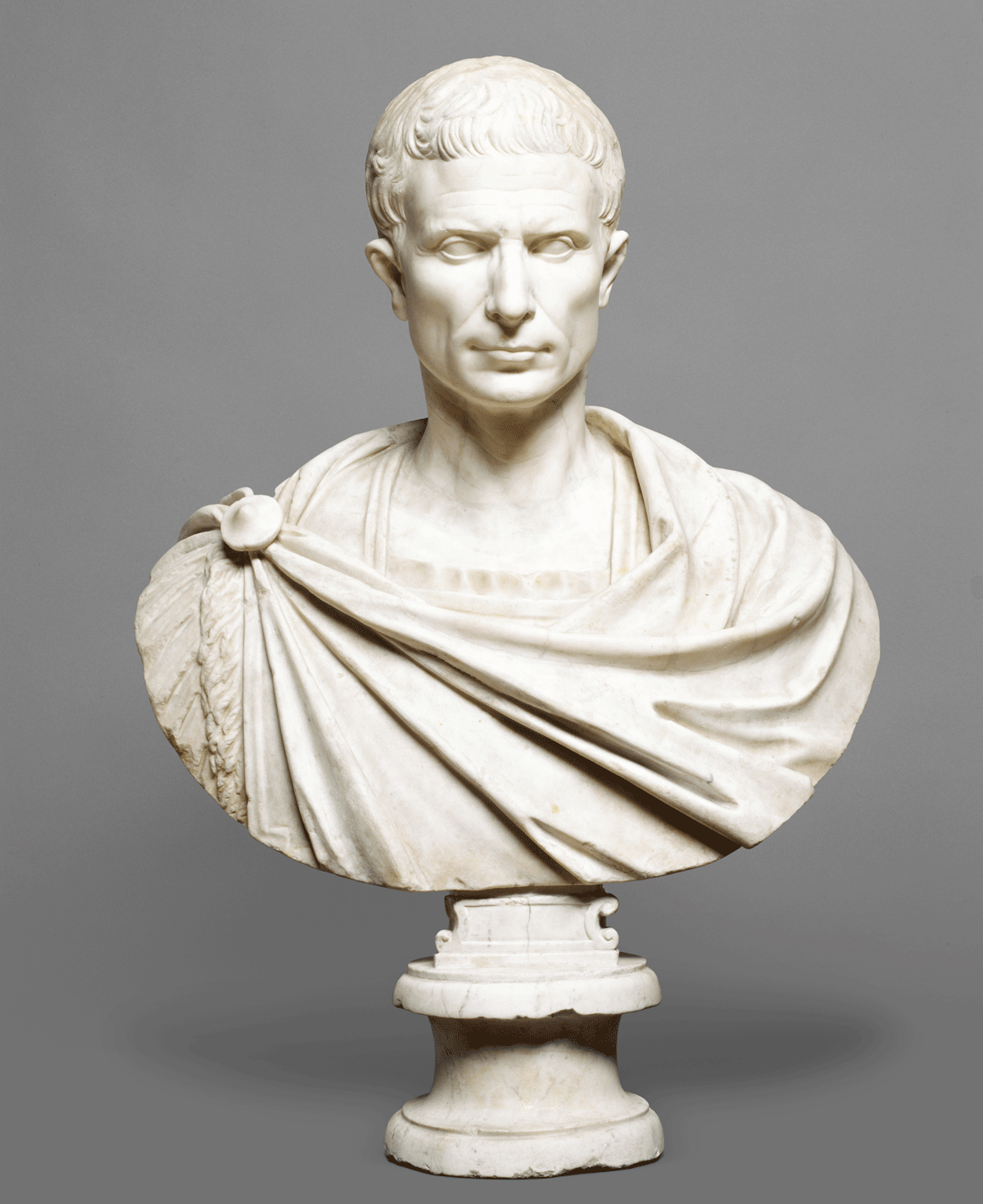
QUEEN CLEOPATRA |
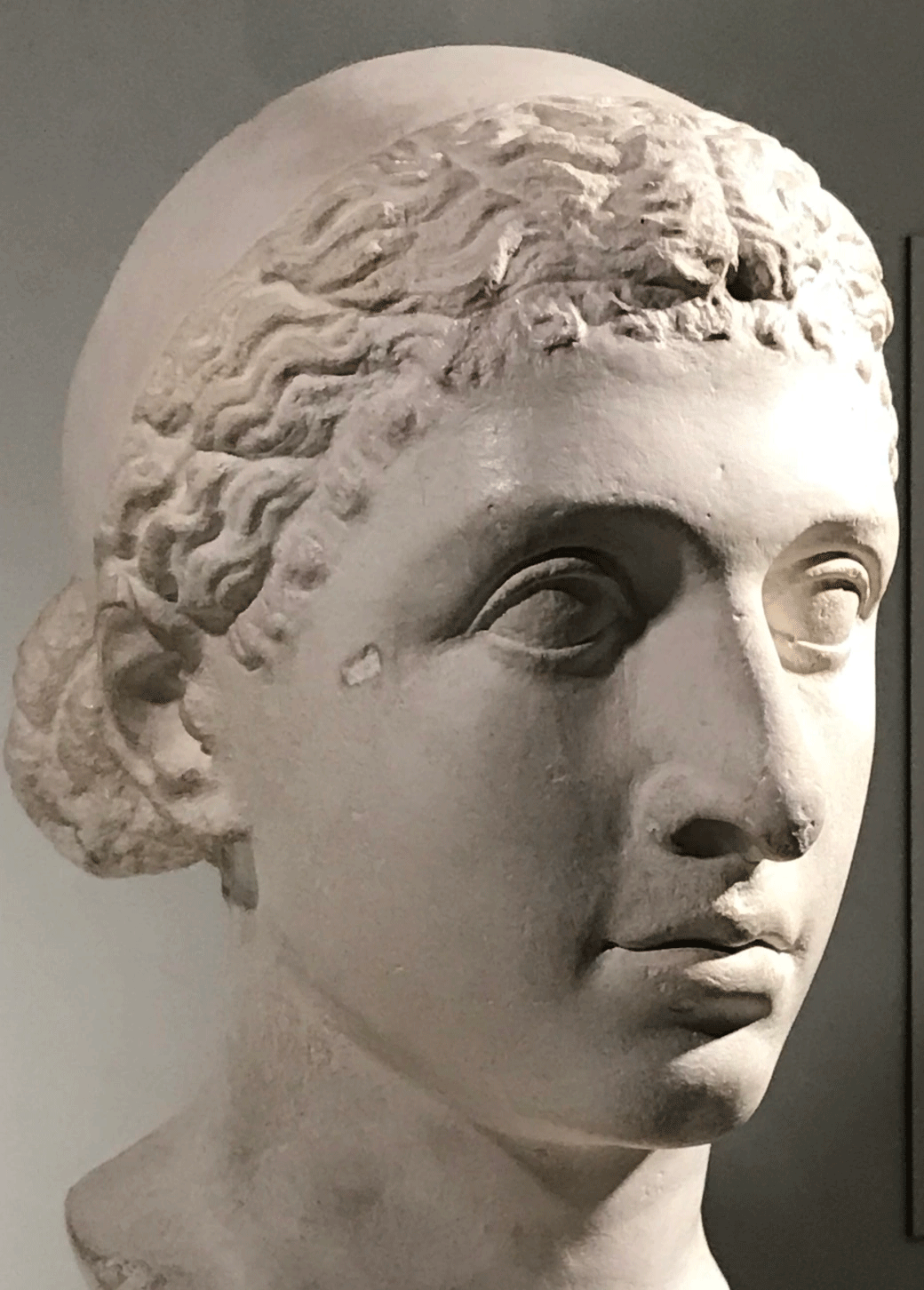
MARC ANTONY |
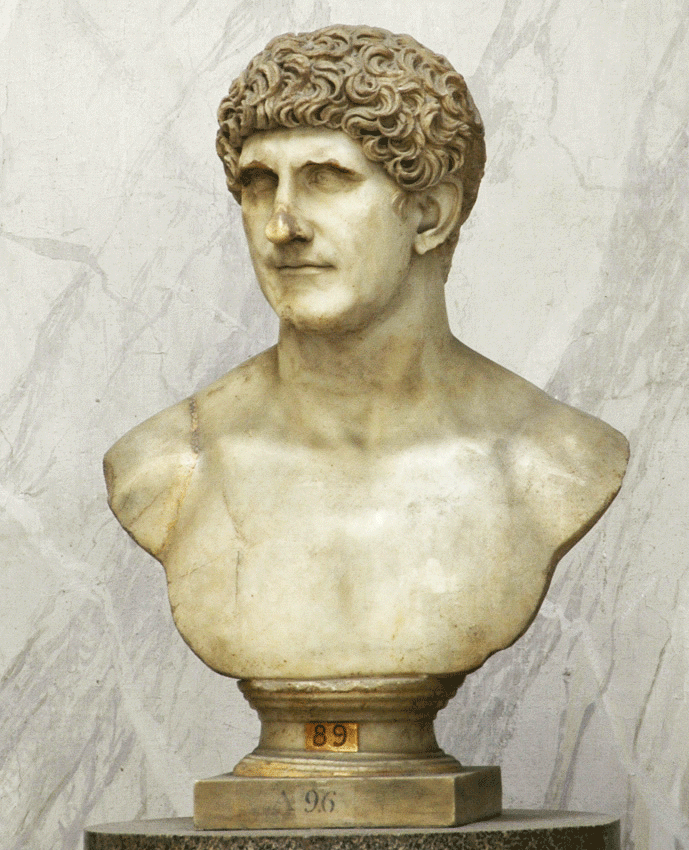
OCTAVIUS |
